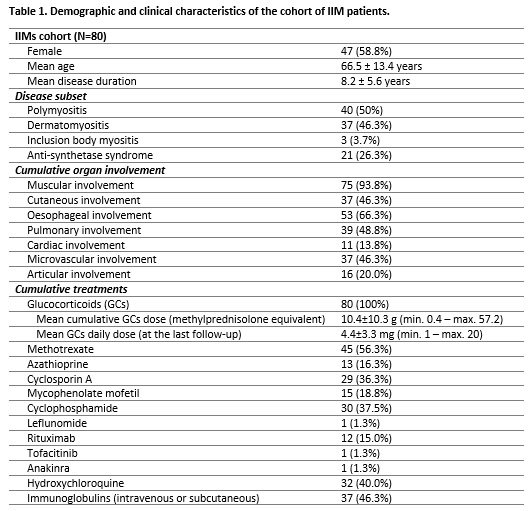Session Information
Date: Monday, November 13, 2023
Title: (1155–1182) Muscle Biology, Myositis & Myopathies – Basic & Clinical Science Poster II
Session Type: Poster Session B
Session Time: 9:00AM-11:00AM
Background/Purpose: Although the prognosis of Idiopathic Inflammatory Myopathies (IIMs) has noticeably improved over time, their chronicity may still expose a considerable number of patients to the development of persistent damage. The purpose of the study was a retrospective analysis of damage accrual in a monocentric cohort of IIM patients, with the aim of also finding possible correlations with epidemiological and clinical data and assessing the impact of damage on patients’ quality of life (QoL).
Methods: Consecutive adult patients with a diagnosis of IIM (2017 EULAR/ACR criteria) for at least one year and regularly followed at our Myositis Clinic were recruited. Demographic and clinical features were recorded. At the last follow-up, the Myositis Damage Index (MDI) was applied. IIM activity was evaluated according to the International Myositis Assessment and Clinical Studies Group Disease Activity Core Set Measures. To investigate QoL, patients were asked to fill in generic Patient Reported Outcomes (PROs). Results were reported as mean±SD or median (IQR) for continuous variables and as percentage for categorical variables. Intergroup comparisons were assessed by using chi-square and Mann-Whitney tests, as appropriate. Spearman’s coefficient was used to analyse correlations between variables. P values < 0.05 were considered significant.
Results: Eighty IIM patients were enrolled. Demographic and clinical features of the cohort are shown in Table 1. Overall, 78 patients (97.5%) developed at least one item of damage. Using the MDI tool, the damage was represented as follows: global damage VAS 0.75 (0.92); MDI extent of damage score 10.8% (±6.9); MDI severity of damage score 8.2% (10.0). As expected, damage correlated positively with patients’ age (r=0.467, p< 0.001) and disease duration (r=0.302, p=0.007). A greater damage was associated with cumulative muscle (p=0.044) and oesophageal (p=0.005) involvement. A positive correlation emerged between damage and the cumulative dose of glucocorticoids (r=0.404, p=0.003), even when adjusted for patients’ age. Correlations were also found between a greater damage accrual and a history of treatment with mycophenolate mofetil (p=0.039), cyclophosphamide (p=0.045) and immunoglobulins (p=0.007). Among disease activity measures, damage correlated with Physician and Patient Global Assessment, Health Assessment Questionnaire (all r≥0.322, p≤0.015) and Manual Muscle Testing-8 (r< -0.436, p< 0.001) at the last follow-up. As for patients’ QoL evaluated by PROs, a higher global damage correlated negatively with several domains of the Short Form-36 and with fatigue assessed by the Functional Assessment of Chronic Illness Therapy (all r≤-0.332, p≤0.021) and positively with the depression subscale score of the Hospital Anxiety and Depression Scale and with activity impairment assessed by the Work Productivity and Activity Impairment Questionnaire (all r≥0.367, p≤0.023).
Conclusion: IIMs are conditions burdened by a significant damage accrual that can lead to disability and significantly impact patients’ QoL, emphasising the need for appropriate strategies to reduce its accumulation, that still represents an unmet need for these patients.
To cite this abstract in AMA style:
Cardelli C, Barsotti S, Laurino E, Diomedi M, Fattorini F, Tripoli A, Carli L, Mosca M. Damage Accrual in Idiopathic Inflammatory Myopathies: Data from a Monocentric Cohort and Impact on Patients’ Quality of Life [abstract]. Arthritis Rheumatol. 2023; 75 (suppl 9). https://acrabstracts.org/abstract/damage-accrual-in-idiopathic-inflammatory-myopathies-data-from-a-monocentric-cohort-and-impact-on-patients-quality-of-life/. Accessed .« Back to ACR Convergence 2023
ACR Meeting Abstracts - https://acrabstracts.org/abstract/damage-accrual-in-idiopathic-inflammatory-myopathies-data-from-a-monocentric-cohort-and-impact-on-patients-quality-of-life/

